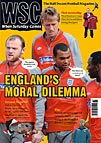 Ian Plenderleith uses websites like YouTube to discover a metaphorical gold mine of bad punditry from around the world
Ian Plenderleith uses websites like YouTube to discover a metaphorical gold mine of bad punditry from around the world
Who is the game’s worst broadcaster? The debate has embraced a wider cast of dubious characters now that we can head to YouTube to hear the gibbering vacuity and perverse analysis of commentators and pundits from around the world. And, thanks to the internet, British viewers were well warned ahead of the arrival on their screens this year of the lead candidate for football’s most nonsensical TV goon, ESPN’s diminutive, smooth-topped Irish export, Tommy Smyth.